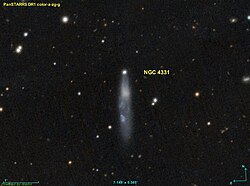NGC 4331 is an irregular galaxy located 74 million light-years away[2] in the constellation Draco. The galaxy was discovered by astronomer William Herschel on December 12, 1797.[3] The galaxy is host to a black hole with an estimated mass of 4.6×105 solar masses.[4]
| NGC 4331 | |
|---|---|
 Image of NGC 4331 by PanSTARRS. | |
| Observation data (J2000 epoch) | |
| Constellation | Draco |
| Right ascension | 12h 22m 35.9s[1] |
| Declination | 76° 10′ 21″[1] |
| Redshift | 0.005234[1] |
| Heliocentric radial velocity | 1569 km/s[1] |
| Distance | 73.8 Mly (22.63 Mpc)[1] |
| Group or cluster | NGC 4291 Group |
| Apparent magnitude (V) | 14.64[1] |
| Characteristics | |
| Type | Im?[1] |
| Size | ~48,100 ly (14.74 kpc) (estimated)[1] |
| Apparent size (V) | 2.2 x 0.4[1] |
| Other designations | |
| UGC 07449, PGC 040085, MCG +13-09-026, VII Zw 451[1] | |
NGC 4331 is a member of the NGC 4291 Group, which also contains the active galaxy NGC 4319[5][6][7][8] and is an X-ray bright member of the group.[9] The NGC 4291 Group is located within the Canes Venatici-Camelopardalis Cloud,[5] which lies in the First Upper Plane of the Virgo Supercluster.[6]
See also
editReferences
edit- ^ a b c d e f g h i j "NASA/IPAC Extragalactic Database". Results for NGC 4331. Retrieved 2024-06-23.
- ^ "Your NED Search Results". ned.ipac.caltech.edu. Retrieved 2024-06-24.
- ^ "New General Catalog Objects: NGC 4300 - 4349". cseligman.com. Retrieved 2024-06-24.
- ^ Dullo, Bililign T.; Bouquin, Alexandre Y. K.; de Paz, Armando Gil; Knapen, Johan H.; Gorgas, Javier (2020-07-01). "The Black Hole Mass–Color Relations for Early- and Late-type Galaxies: Red and Blue Sequences". The Astrophysical Journal. 898 (1): 83. arXiv:2006.10128. Bibcode:2020ApJ...898...83D. doi:10.3847/1538-4357/ab9dff. ISSN 0004-637X.
- ^ a b Tully, R. Brent (1988). Nearby galaxies catalog. Cambridge; New York: Cambridge University Press. ISBN 978-0-521-35299-4.
- ^ a b Fouque, P.; Gourgoulhon, E.; Chamaraux, P.; Paturel, G. (1992-05-01). "Groups of galaxies within 80 Mpc. II. The catalogue of groups and group members". Astronomy and Astrophysics Supplement Series. 93: 211–233. Bibcode:1992A&AS...93..211F. ISSN 0365-0138.
- ^ Garcia, A. M. (1993-07-01). "General study of group membership. II. Determination of nearby groups". Astronomy and Astrophysics Supplement Series. 100: 47–90. Bibcode:1993A&AS..100...47G. ISSN 0365-0138.
- ^ Giuricin, Giuliano; Marinoni, Christian; Ceriani, Lorenzo; Pisani, Armando (2000-11-01). "Nearby Optical Galaxies: Selection of the Sample and Identification of Groups". The Astrophysical Journal. 543 (1): 178–194. arXiv:astro-ph/0001140. Bibcode:2000ApJ...543..178G. doi:10.1086/317070. ISSN 0004-637X.
- ^ "Detailed Object Classifications". ned.ipac.caltech.edu. Retrieved 2024-06-24.
External links
edit- NGC 4331 on WikiSky: DSS2, SDSS, GALEX, IRAS, Hydrogen α, X-Ray, Astrophoto, Sky Map, Articles and images